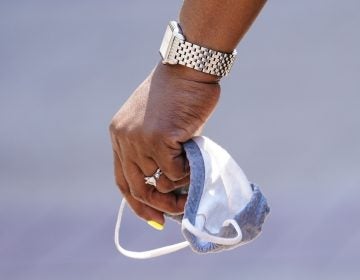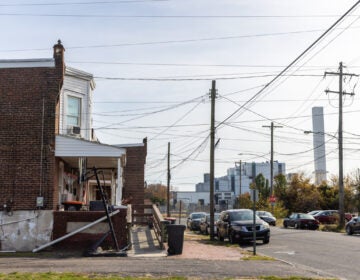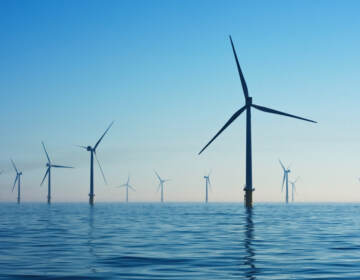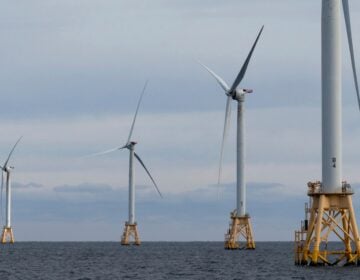Jobs or the environment? Ahead of 2022, Pa. Dems thread needle on ‘false choice’
Debates about fracking and pipelines have created a conundrum for Democrats in the past few decades, as they court both environmentalists and organized labor.
Listen 5:02
Megan and Bob White with their three kids in their Chester County backyard. Work on the Mariner East 2 pipeline has turned half the property into a construction site, and the project has been plagued by sinkholes and schedule overruns. (Katie Meyer/WHYY)
Megan White didn’t pay close attention to politics until the day in 2015 when a representative from Sunoco came to the door of her suburban Chester County home and told her the company needed to route a new pipeline through her yard.
At the time, White and her husband were busy parents of a 1-year-old and didn’t give it much thought. The representative, White recalls, told them construction would last for a year or two, and “we would never know they were here.
It’s a promise many of White’s neighbors also remember — and one they now resent. Construction on the Mariner East pipeline project started in earnest in 2017 in White’s area. Today, half of her backyard in West Whiteland Township remains hidden behind a plywood fence, swarming with heavy equipment and construction workers just beyond behind her kids’ swingset and trampoline.
“It’s 2021, and my daughter’s now 7,” White said. “It’s taken up most of her childhood.”
Across Pennsylvania, debates about energy policy in the past few decades have largely centered on two issues: fracking and pipelines.
It has created a conundrum for politicians — particularly for Democrats, given two key tenets of their party: protecting people and the environment from the ill effects of fossil fuels and supporting organized labor, which has thousands of workers in the commonwealth’s energy sector.
The debates can be symbolic. Whoever wins Pennsylvania’s 2022 U.S. Senate race, for instance, probably won’t have much say over the Mariner East pipeline. But for the candidates already lining up for the Democratic primaries for governor and Senate, striking the right balance on these issues could be a matter of political life or death.
‘All about man-hours’
Often, that political calculus divides candidates between the west and the east. In Western Pennsylvania, where fracking was big business during the boom of the late aughts and 2010s, Democrats have a tendency to be more supportive of the natural gas industry. Some members of the party to the east, which has primarily experienced the energy industry though disruptive pipelines, have been less inclined to get on board.
One recent Democratic effort to increase oversight of drillers saw the State House and Senate both sponsor bills with overwhelming support from eastern Pennsylvania. In the House, 23 of the legislation’s 28 sponsors were from the east; in the Senate, six of the seven were.
But the divisions aren’t just regional. Even within the Philadelphia suburbs, clear lines have been drawn between people who see the natural gas industry, and pipelines, as a necessary boon to workers and those who think they’re a symptom of unacceptable reliance on fossil fuels.
Jim Snell is a business manager with Steamfitters Local 420, which represents workers across the eastern part of Pennsylvania, including Chester County. They’re historically aligned with Democrats, but he sees himself, and the union, as politically pragmatic — and he has a very straightforward calculus for whether he supports a politician.
“Listen, everybody wants clean air, clean water,” he said. “But in my line of work, we’re all about man-hours.”
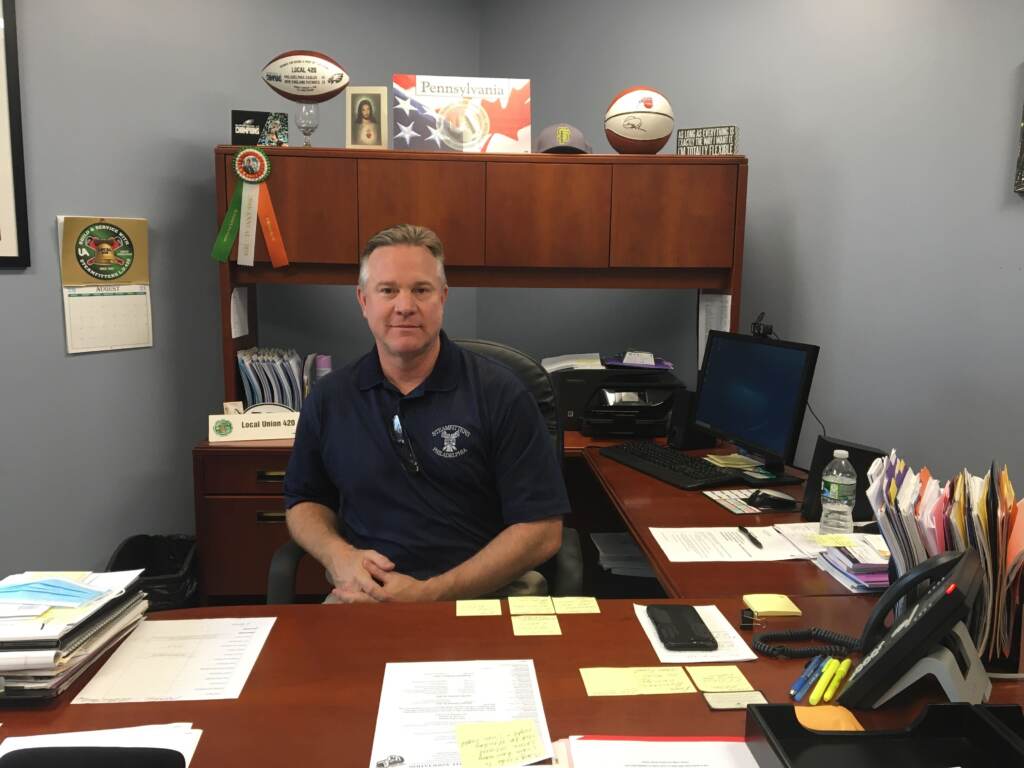
The workers Snell represents are pipe experts. Their man-hours are often spent installing systems in commercial and residential construction projects, but also important, Snell says, is the energy sector. Right now, he estimates 250 of his members are working on the Mariner East project, along with hundreds of other building tradesmen and women.
Environmentalists have argued in the past that this number of — by nature, temporary — jobs doesn’t justify the environmental impact of a pipeline. But Snell notes the Mariner East delivers natural gas liquids to the Marcus Hook Industrial Complex in Delaware County for distribution. He says he’s expecting even more jobs in the complex once the pipeline is fully finished — though he doesn’t give details.
“There’s bountiful work coming,” he said. “I’m going to have hundreds of steamfitters working at this site. The Philadelphia building trades as a whole will have a few thousand working at this site.”
Snell and the building trades have a lot of powerful company on this side of the energy debate. Since Pennsylvania’s fracking boom began, corporations that profit from the industry have spent tens of millions of dollars lobbying state politicians or contributing to their campaigns. Labor, particularly the building trades, has also allied itself with chambers of commerce and developers in the effort to promote and defend pipeline projects.
Kurt Knaus, spokesman for the pro-pipeline group Pennsylvania Energy Infrastructure Alliance, says the coalition agrees, as a matter of principle, that climate change is real and that the commonwealth must eventually transition away from natural gas, but he thinks fracking and pipeline opponents are being unreasonable.
“The transition isn’t going to happen by simply flipping a switch,” he said. “There’s a practical matter, in that most people who work in energy recognize the need for all forms of energy. But the other side, they seem to simply refuse that there’s still a tremendous need for these traditional energy resources.”
Many pipelines do carry natural gas used for energy. But the natural gas liquids in the Mariner East lines are shipped overseas and are used to manufacture plastics.
David Masur, who heads the environmentalist group PennEnvironment, says Knaus’ argument is a cop-out.
“If my kid said something like that, going like, ‘I know I shouldn’t eat Ding Dongs all day, but I don’t know what else to eat’ — somebody’s got to call BS,” he said.
Masur believes there are things Pennsylvania can and should be doing now to begin that transition away from fossil fuels — like creating clear milestones for the percentage of energy that should come from clean sources, and putting a higher tax burden on polluting industries. If Pennsylvania does those things, he thinks, jobs in cleaner industries will follow.
He doesn’t like to blame labor too much for what he sees as a lack of action — but he does think the building trades’ alliances with the gas industry have hamstrung Democrats.
“They’re probably some of the biggest reasons why we can’t pass climate policy today,” Masur said. “That’s a reality in Harrisburg. It becomes a reality in D.C. because they can peel off a whole set of Democrats to, often, side with the bulk of the Republican caucus.”
The pipeline to political awakening
In Chester County, at least some of the people who, thanks to the pipes running through their backyards, have found themselves deeply involved in Pennsylvania’s energy debate have come to see the issue as revealing larger problems in government.
The entire length of the Mariner East project has seen drilling mud spills, which can damage streams and wetlands, and the sections that run through dense residential areas in the southeast have been plagued by disruptive sinkholes, thanks to the porous limestone, known as karst, on which the region sits.
Energy Transfer, which now owns Sunoco and manages the project, has racked up millions of dollars in financial penalties for Mariner-related violations alone, and the state Department of Environmental Protection shut down the project completely for permit violations in 2018. Sinkholes related to the project became so bad on one Chester County street, Lisa Drive, that several properties became unsafe, homeowners were displaced, and the company had to buy the houses.
The new lines, and the sinkholes that come with them, are also directly next to 1930s-era pipes that still carry explosive natural gas liquids. For Ginny Marcille-Kerslake, who lives in West Whiteland and has had pipeline construction on and around her property for the last several years, that’s the scariest part.
“It’s not just a sinkhole,” she said. “It’s a sinkhole that’s happening in close proximity to these two 90-year-old pipelines that are transporting these highly explosive products.”

Jessica DeLeandro, who lives down the street from the White family and has construction in her own yard, says that possibility haunts her.
“I have two children, which is very nerve-wracking,” DeLeandro said. “Every morning when I leave for work, now that they are not in school, the anxiety is — I can’t even describe, God forbid there was an emergency.”
There’s a basis for these fears. Explosions in natural gas pipelines can and do happen. In 2018, a different pipeline in rural Western Pennsylvania, the then-newly installed Revolution line, which was carrying a mix of hydrocarbons including methane, ethane and butane, exploded after a landslide. One family was forced to flee for their lives, and their house was left in ruins.
The Mariner East pipeline runs through much more densely populated areas in Southeastern Pennsylvania. Along with residential neighborhoods, it’s close to a school and a public library.
DeLeandro describes herself as politically nonpartisan — “I’m an American,” she said when asked to describe her affiliation — but says her experience has spurred her to support stricter regulation of the energy industry. Her biggest political ask now is “accountability.”
Megan White also considers herself fairly politically neutral, if left-leaning. But like DeLeandro, her up-close view of the pipeline has given her a lasting distrust toward politicians who she sees as soft on natural gas companies like Energy Transfer.
“It’s just big money,” she said. “They buy their way through, they just keep throwing money around, and … us little people just have to deal with stuff like this.”
For Kerslake, it’s been a true political awakening.
She had worked for years as a soil analyst in her native Canada, and says when Sunoco first knocked on her door in 2015, it felt natural to throw herself into learning about natural gas liquids, pipelines, and problems that can come with them. Less expected, she said, was the political aspect.
“That was the huge wake-up call,” she said. “Once you realize that, and you realize our government has allowed that to happen, then it just blows everything up for you.”
Kerslake ran for the State House in 2020. She was up against a party-endorsed Democrat and lost in the primary, but says the experience hasn’t dampened her desire to hold energy companies accountable. She founded the group West Whiteland Residents for Pipeline Safety, and now works as an organizer for the national group Food and Water Watch. She also works closely with a fellow pipeline activist from a neighboring district who did get elected to the House — Danielle Friel-Otten.
Otten, a Democrat, is now about two years into her tenure representing Chester County’s 155th Legislative District.
She has tangled with energy companies, and with labor, many times during her time in office. But now, she’s quick to note that her gripe is not with workers. “My dad was a teamster, my brothers are union guys,” she said. “My one brother is a steamfitter.”
The problem, as she sees it, is just the enormous power oil and gas companies have in Pennsylvania. She doesn’t think that will go away quickly, but she is encouraged by new action on the federal level, like components of the newly passed infrastructure package aimed at modernizing the electrical grid to use cleaner energy sources, and cleaning up Superfund sites.
“I have a lot of hope at the federal level,” she said. “In the state … you look up at the ceiling [in the Capitol] and it’s paintings of coal and oil wells. I know that it’s a hard fight.”
The happiest medium
This is the terrain Democratic candidates for Pennsylvania political office now have to navigate.
In the 2022 U.S. Senate race, all the major contenders for the Democratic nomination have begun staking out positions on fracking, pipelines, and how the country should respond to climate change. And despite some differences in tone and specifics, all have attempted to split the difference between supporting union energy jobs and getting rid of fossil fuels.
One of the most outspoken candidates on energy has been John Fetterman, the current lieutenant governor and former mayor of Braddock, in Allegheny County.
“It’s a total false choice that we have to choose between jobs and a clean environment,” a spokesman for Fetterman said in an email. “That’s just not true. We can have both, that’s why John is always going to fight for creating thousands upon thousands of green, good-paying union jobs as we transition.”
He added that Fetterman has “never taken a dime from the fossil fuel industry, and he never will,” and believes climate change is an “existential threat,” but believes “we also have to preserve the union way of life for the thousands of workers currently employed by the natural gas industry in Pennsylvania and the communities where they live. We can’t just abandon these people, and tell them to go learn how to code.”
Fetterman is progressive — along with preserving union jobs while transitioning to clean energy, he has centered marijuana legalization and criminal justice reform in his campaign. But on energy, his tone skews toward that of U.S. Rep. Conor Lamb, a more moderate Senate candidate who also is from Allegheny County.
Lamb, a second-term congressman elected in an area that former President Donald Trump dominated, has been heavily involved in the Biden administration’s efforts to bridge party divides on energy. He helped author Democrats’ unity energy platform last year, which sought to align the disparate interests of labor, environmentalists, and the energy industry, and told the Pittsburgh Post-Gazette during the rollout of that plan that “natural gas is here, it’s not going anywhere.”
He has rejected progressive environmental efforts like the Green New Deal, which aims to phase out fossil fuels on a much faster timeline.
“We understand, for many industrial processes, fossil fuels are going to be a critical component for years to come,” Lamb told the Post-Gazette. “There’s no escaping that.”
Candidates from the eastern part of the state have, in general, been less friendly to the gas industry. State Rep. Malcolm Kenyatta, a contender from Philadelphia, is the only major Senate candidate to have said he will support “a moratorium on fracking.”
A spokesperson says Kenyatta backs “a complete end to tax breaks for oil and gas giants” but that, like Fetterman and Lamb, he thinks an equal priority has to be having “dignified jobs that can support workers and their families in clean energy ready to replace jobs in the fossil fuel industry.”
Val Arkoosh, a physician and Montgomery County Commissioner who, like Kenyatta, has a base of support that’s geographically far from fracking, also opted for a middle road.
A spokesperson says she wants to protect air and water, and “supports investments in renewable energy sources to create sustainable, good-paying, union jobs, while ensuring workers can train for the jobs of the future and feed their families.”
In the gubernatorial race, Attorney General Josh Shapiro appears to be the only major contender for the Democratic nomination.
He hasn’t officially announced his candidacy yet or released policy positions, but over the course of his AG tenure Shapiro has periodically taken the natural gas industry to task — most significantly, in a sweeping grand jury report last year that accused the Department of Environmental Protection of failing to properly regulate fracking, and said the “lucrative but often destructive enterprise” had negative effects on Pennsylvanians’ health.
There are still many months until the election. Megan White, the West Whiteland homeowner with construction workers in her backyard, says she still doesn’t know who she’ll end up supporting for governor or U.S. Senate.
But she does know what she wants to hear from a candidate: “That they’re here for the people. That they’ll do what’s right. That they’ll protect us.”
Right now, she said, “I don’t feel protected. I don’t feel that anyone cares.”
WHYY is your source for fact-based, in-depth journalism and information. As a nonprofit organization, we rely on financial support from readers like you. Please give today.





